A job well done: Couple reclaims 6-acre farm in South Kona
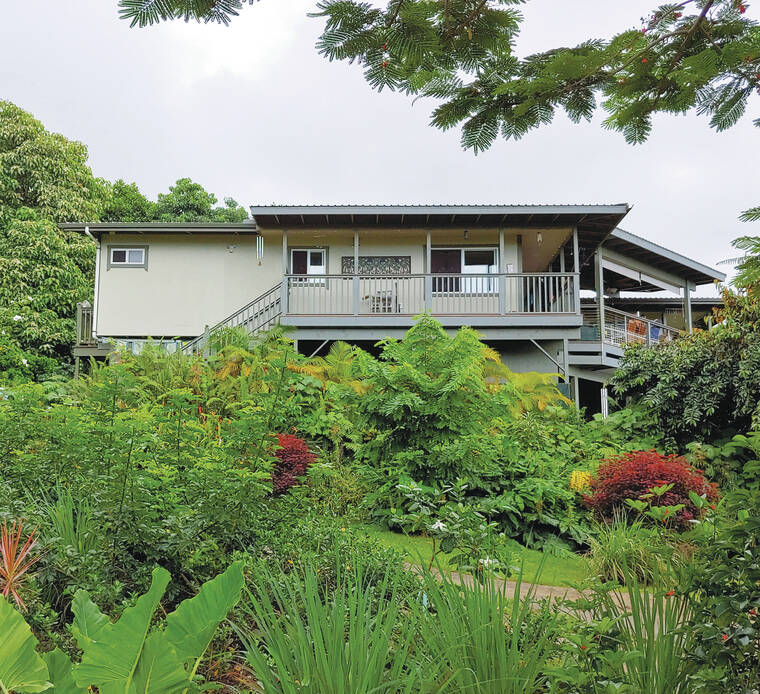
Carolyn and Debbie made many improvements to their farmhouse including a new lanai providing an expansive coastline view. (Diana Duff/Special to West Hawaii Today)
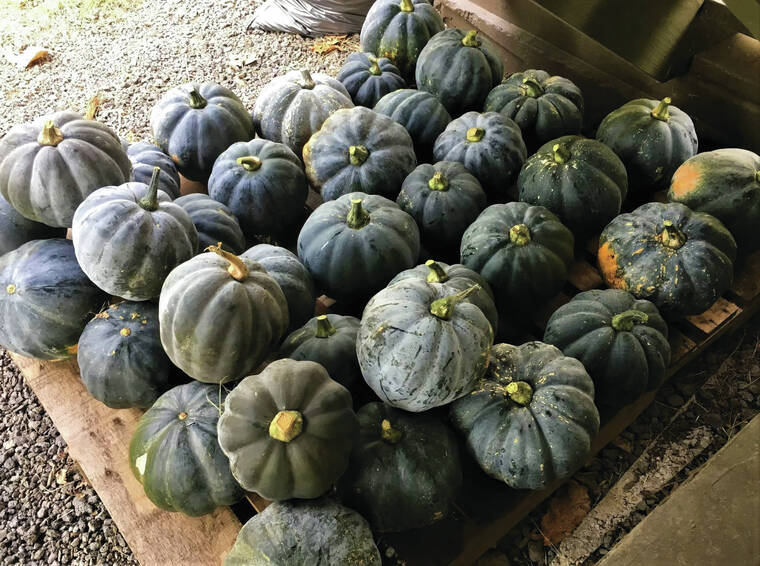
Kabocha squash is one of the latest cash crops Carolyn and Debbie have added to their farm. (Carolyn Witcover/via Diana Duff)
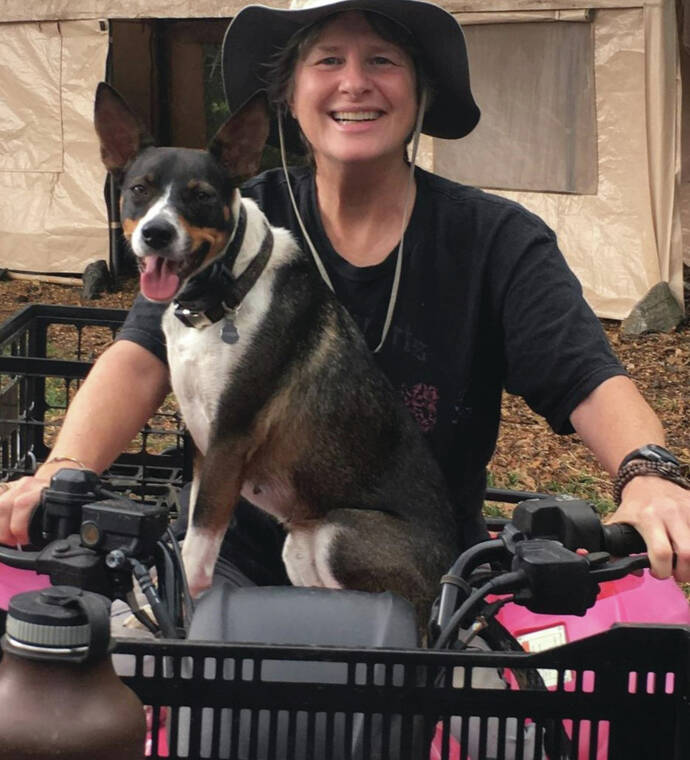
Carolyn’s dog Piper often accompanies her on one of her ATV tours of the farm. (Debbie Coke/Via Diana Duff)
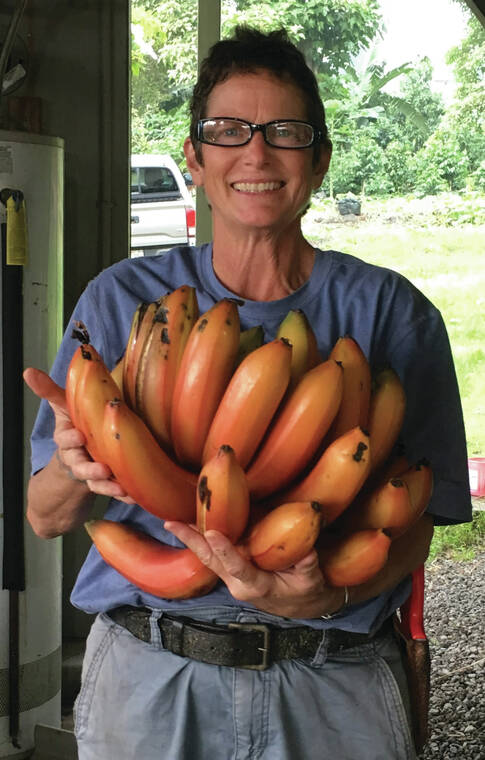
Debbie enjoys the variety of uses and flavors that their multiple banana varieties offer. (Carolyn Witcover/via Diana Duff)
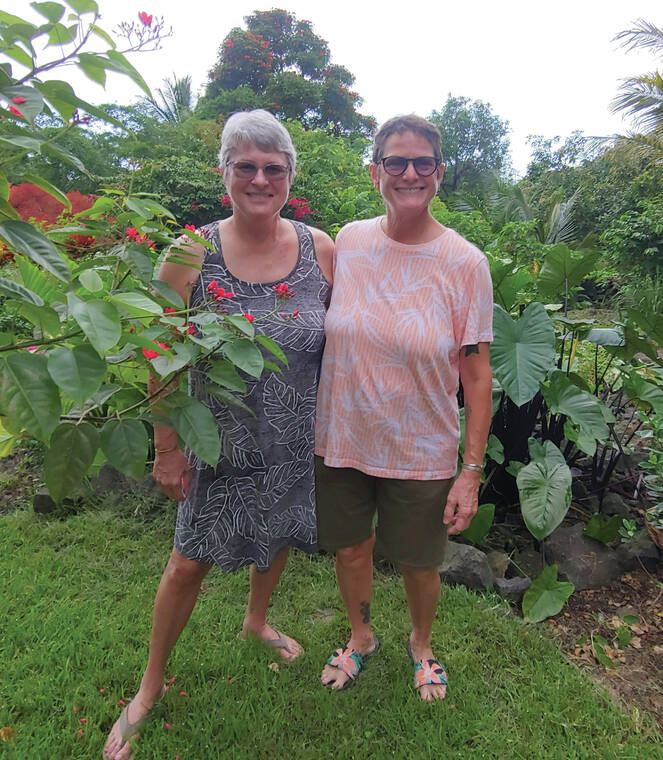
Carolyn and Debbie enjoy visiting their new meditation garden to relax after a hard day of work. (Diana Duff/Special to West Hawaii Today)
When Carolyn Witcover and Debbie Coke bought the lease on a ramshackle coffee farm in South Kona, they knew they had some work to do. Though they were prepared for a steep learning curve and months of hard labor, they were determined to make their farm productive and try to find pleasure in the process.
When Carolyn Witcover and Debbie Coke bought the lease on a ramshackle coffee farm in South Kona, they knew they had some work to do. Though they were prepared for a steep learning curve and months of hard labor, they were determined to make their farm productive and try to find pleasure in the process.
Seven years later, Debbie was quick to point out, “We really wouldn’t trade the last seven years for anything. We have enjoyed the ride.”
Carolyn feels farming might be in her blood. Her mother grew up on a family cotton farm in South Carolina where young Carolyn first witnessed the hard work and satisfaction of farm work. As an adult she enjoyed planting and maintaining a large garden on a 10-acre property she owned in Memphis, Tennessee.
In 2006, Carolyn came to Hawaii and a whole new world opened to her. She came to set up a business for friends who were starting a bakery. Her intention was to stay a few months, but she fell in love with Hawaii and stayed more than a year. While here, she met some local farmers and was intrigued by the prospect of year-round growing and fascinated by the variety of tropical plants available here. Though she returned to Memphis in late 2007, the dream of farming in Hawaii stayed with her.
She visited Hawaii every year after she left. In 2010, Debbie joined her at a housesitting job on a coffee farm. That convinced them both that they should pursue farming in Hawaii.
Debbie and Carolyn had stressful jobs in Tennessee, but spent their free time designing gardens at their home they filled with flowering plants. Gardening was relaxing and rewarding for them and they dreamed of moving to Hawaii where they could garden year-round. When Debbie’s company downsized, they decided it might be time to look for land in Hawaii.
In 2013, the pair came to Hawaii on a visit to look for a farm. They found what they could afford just off Middle Ke’ei Road in South Kona. It was 6 overgrown acres, planted in coffee, macnuts and a variety of fruit trees. A house on the property afforded a sweeping view of the coastline seven hundred feet below. They were smitten.
By early 2014, they signed the Kamehameha Schools lease, moved into the house and began working. Over the years, they have reclaimed the coffee and macnuts, maintained and replanted fruit trees, added a lanai to the house and recently installed a beautiful meditation garden. They now have a productive farm and are truly pleased with both the process and the results. It wasn’t all easy, however.
Before they bought the lease, the farm had been neglected for several years. Then it sat abandoned for three more years. The 100 macnut trees were barely visible through the tall guinea grass. The 1,800 coffee trees were completely covered in vines. Some of the fruit trees were dead or dying, the irrigation system was broken and the soil was rock hard and covered in weeds. Carolyn and Debbie rolled up their sleeves, bought a weed whacker and a truck, hired a few helpers and went to work.
Fearing the hard work ahead, they decided to name their farm Ma’alahi. They had learned that the word might mean easy in Hawaiian. On further research they also learned that it might also be used to describe satisfaction with a job well done. Both of these ideas appealed to the pair and the name stuck.
Their first goal was to get the coffee trees into production. Vine removal required lots of shoulder and arm strain. For these two women in their fifties, the hard work seemed to accelerate the aging of their bodies. During their years on the farm, they each needed surgical procedures to repair their overworked bodies. They decided to slow down and simplify.
Carolyn was delighted to buy a tractor with a mower to keep the grass down in the macnut orchard. Debbie loved weed whacking but decided to let some of the areas of the farm go wild.
After the first few tough years, Carolyn said, “We learned to work smarter by simplifying our tasks and accepting that some areas of the farm might be messy.”
To deal with the constant pig damage in their orchards, they decided to fence the areas. That also helped reduce their labor.
Rather than doing extensive and expensive repairs on the irrigation system, they removed it and joined the USDA NRCS cost sharing program for mulching. Weather changes in Kona seemed to bring more rain and with layers of mulch in place for weed suppression and water retention, rainfall would suffice.
After Carolyn experienced several serious injuries, she and Debbie decided to further break down the work into segments each could manage and to delegate some of it to hired helpers. Years of experience as a commercial banker meant Carolyn was well equipped to handle the accounting and business management. She also did a lot of the research on ways to deal with problems on the farm.
Issues that required attention started to pile up. Though they had a low infestation of coffee berry borers, they needed to manage them and implement preventive practices. Little fire ants took up residence in a small area of the farm. They were able to stop them from spreading into other areas, but extra work was required to contain them. Then, the coffee leaf rust fungus arrived. They are treating it with copper as recommended by the local UH extension office. That’s a lot of extra work.
While Carolyn did lots of agricultural research, they both found that attending UH CTAHR workshops and joining local commodity groups allowed them to get first hand, well researched information. It also meant they could meet other farmers with similar problems and a variety of solutions. Conferences, online research and a few good books have enabled them to keep farm problems under control.
Debbie is happy to continue weed whacking and doing a lot of the labor required but finds her greatest pleasure in designing, planting and maintaining a small meditation garden on the property. Somewhat sealed off from the rest of the farm, bougainvillea, gardenias, taro and elephant ear circle the garden’s grassy center that is shaded by a small jatropha tree. Debbie added a small succulent garden to the border as part of her research of drought tolerant plants. A sitting bench provides a place for her and other workers to relax and enjoy the beauty of this lovely small space
The arrival of the coffee leaf rust after several years of hard reclamation work, made the need to diversify clear. They wanted to expand their knowledge, become more involved in the community and try new crops. They joined the Ulu Cooperative, Kona Coffee Farmers Association and the Macadamia Nut Association.
Diversity for them includes exploring agroforestry with ulu, squash, taro and several varieties of bananas and avocados. Today they are growing many tropical fruit varieties as well. Their plants include white pineapple, papaya, longan, lychee, rambutan, star fruit, star apple, mango, ice cream bean, jackfruit, soursop, jaboticaba and citrus.
“Of course, this doesn’t necessarily fit with our goal to simplify,” Carolyn points out. “But we’re having fun growing and eating lots of exotic fruit.”
When asked what advice they might offer new farmers, they laughed and agreed that starting when you are younger than fifty is probably a good idea. They also said that is helpful to understand that farming is a tough business requiring constant attention.
Debbie added, “Farming is also delightful as you watch things grow as you work in harmony with your environment.”
Their dream is still in progress, but these two have done a great job of creating a wonderfully productive farm out of what at first seemed like an insurmountable mess. Good work.
Diana Duff is a plant adviser, educator and consultant living part time in Kailua-Kona.
Gardening Events
Every Saturday: “Work Day at Amy Greenwell Garden” from 9 a.m. to 12:30 p.m. Meet at the Garden Visitor Center across from the Manago Hotel in Captain Cook. Come with a mask and be prepared to practice social distancing. Volunteers can help with garden maintenance and are invited to bring a brown bag lunch. Water and snacks provided. Call Peter at 323-3318 for more information.
Wednesday: “Marketing for New Businesses” online from 11:30 a.m. to 12:30 p.m. Free. Presented by Marketing Guide, Nicole Fisher. Contact Tessie Juario from the Kuha’o Business Center at 808-553-8100 or tessie.juario@mauicounty.gov to register.
Thursday: “5 Considerations for Starting a Business” online from 9 to 10:15 a.m. Free. Presented by Bobby Jackson. Contact Tessie Juario from the Kuha’o Business Center at 808-553-8100 or tessie.juario@mauicounty.gov to register.
Saturday: Deadline to file a claim for the Kona Coffee Class Action Lawsuit. If you sold Kona coffee between Feb. 27, 2015 and March 9, 2021. Go to KonaCoffeeSettlement.com for more information and forms.
Farmer Direct Markets (check websites for the latest hours and online markets)
Wednesday: “Ho‘oulu Farmers Market” at Sheraton Kona Resort &Spa at Keauhou Bay
Saturday: “Keauhou Farmers Market” 8 a.m. to noon at Keauhou Shopping Center
Information on their online market at keauhoufarmersmarket.com/onlinemarket
“Kamuela Farmer’s Market” 7:30 a.m. to noon at Pukalani Stables
“Waimea Homestead Farmers Market” from 7:30 a.m. to noon at the Waimea middle and elementary school playground
Sunday: “Pure Kona Green Market” 9 a.m. to 2 p.m. at Amy Greenwell Garden in Captain Cook
“Hamakua Harvest” 9 a.m. to 2 p.m. at Highway 19 and Mamane Street in Honoka‘a
Plant Advice Lines
Anytime: konamg@ctahr.hawaii.edu; Tuesdays and Thursdays from 9 a.m. to noon at UH-CES in Kainaliu at (808) 322-4893.


